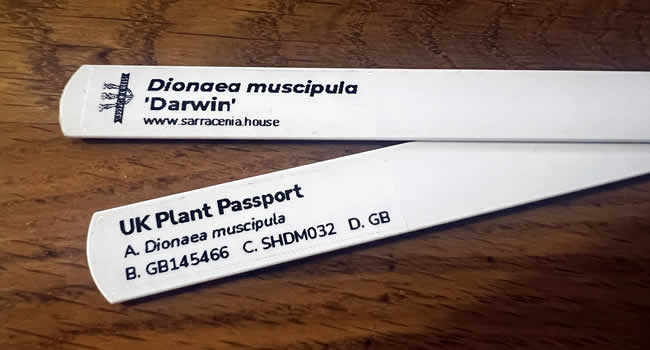
Send us a message

When I started the Sarracenia House website it was important to me that I did everything to as high of a standard as I could. A part of selling carnivorous plants online is to comply with the UK's legislation regarding the movement of plants around the country. So, after reading all of the rules it was clear that I was required by law to join the Plant Passport scheme.
You will have seen Plant Passport information included with your order if you have purchased a carnivorous plant from Sarracenia House. But, unless you are a 'professional operator' this may be something you are unfamiliar with. Below is a short outline of what it's all about.

A UK Plant passport is an official label for the movement of regulated plants within Great Britain. It demonstrates compliance with all plant health requirements for the relevant plant or plant product.
Plant passports ensure that plants and plant products are traced throughout the supply chain and declare compliance with plant health requirements such as freedom from pests, which is essential for maintaining biosecurity.
This scheme requires any professional plant supplier (professional operator) in England or Wales selling plants by distance contract to provide a plant passport to the final user, even if that final user is buying for personal use. To do this, professional operators must register on the Animal & Plant Health Agency’s database and then apply for authorisation (Scotland and Northern Ireland have similar schemes).
Once authorised, the professional operator becomes an authorised operator and can then attach a plant passporting label (the plant passport) for each plant or batch of plants, which must travel with the plants. This means that if a pest or disease is found, APHA can easily and quickly trace all relevant plants to reduce the risk of an outbreak.
In general you do not need to issue a plant passport to members of the public for their own personal use. Exemptions to this rule include if you are a distance seller e.g. selling via mail order, a website or third-party platform such as eBay.
Where is the line between a hobbyist selling a few Sarracenia spares and being considered a professional operator?
If any of the following apply to you, you will likely need to apply to issue plant passports;
I've tried to condense the key information into an easy-to-read blog post but this is quite vast subject. If you want to read more, take a look at the DEFRA website and get in touch with them.
The Animal & Plant Health Agency’s Internet Trading Unit is now starting to engage and work with sales and social media platforms to ensure plants sellers on their sites are legitimate so it's worth making sure that you're selling legally.
Sarracenia leucophylla var. leucophylla - Purple & White Giant (Rt71, Altha, Calhoun County, Florida)
Sarracenia × moorei X oreophila
Here's an interesting Sarracenia alata! This is an areolate form which is relatively unusual for this species. Areoles are small windows on the pi...
View full detailsThis is a beautiful Sarracenia that arguably looks better in the flesh than in photographs. The lip develops into a defined red which looks great a...
View full detailsThis is an attractive Sarracenia oreophila both in shape and pattern. As the name suggests it is heavily veined with the veins getting darker as th...
View full detailsSarracenia × miniata is a hybrid of Sarracenia minor and Sarracenia alata. Both parent species influence the shape of this plant with the distincti...
View full detailsThis vigorous clone of Sarracenia flava is a great plant if you want an easy-to-grow, nice-sized, and hard-as-nails Sarracenia flava var. flava. Th...
View full detailsIP-X125, JS-H155